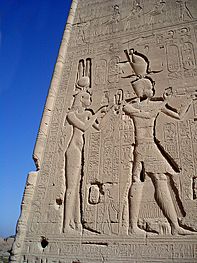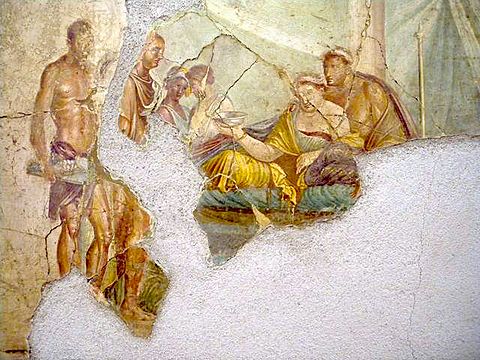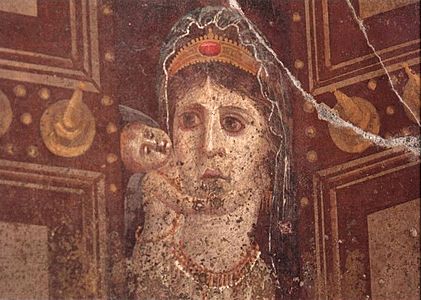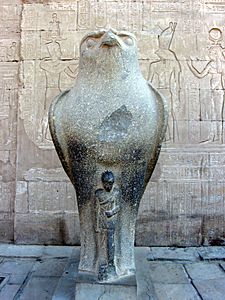Caesarion facts for kids
Quick facts for kids Caesarion |
|
|---|---|
| Ancient Greek: Πτολεμαῖος Φιλοπάτωρ Φιλομήτωρ Καῖσαρ, Καισαρίων Ptolemaĩos Philopátōr Philomḗtōr Kaĩsar, Kaisaríōn |
|
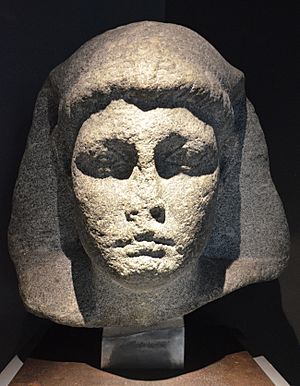 |
|
| King of the Ptolemaic Kingdom | |
| Reign | 2 September 44 BC – late August 30 BC with Cleopatra VII (until 12 August 30 BC) (Ptolemaic dynasty) |
| Predecessor | Ptolemy XIV and Cleopatra VII |
| Successor | Position abolished |
| Father | Julius Caesar (allegedly) |
| Mother | Cleopatra VII |
| Born | 23 June 47 BC Ptolemaic Kingdom |
| Died | late August 30 BC (aged 17) Alexandria, Roman Egypt |
Ptolemy XV Caesar (/ˈtɒləmi/; Greek: Πτολεμαῖος Ptolemaĩos; 23 June 47 BC – August 30 BC), nicknamed Caesarion (Καισαρίων, "Little Caesar"), was the last pharaoh of Ptolemaic Egypt, reigning with his mother Cleopatra VII from 2 September 44 BC until her death by 12 August 30 BC, then as sole ruler until his death was ordered by Octavian (who would become the first Roman emperor as Augustus).
Caesarion was the eldest son of Cleopatra and the only known biological son of Julius Caesar, after whom he was named. He was the last sovereign member of the Ptolemaic dynasty of Egypt.
Contents
Early life
Ptolemy Caesar Philopator Philometor was born in Egypt on 23 June 47 BC. His mother Cleopatra insisted that he was the son of Roman politician and dictator Julius Caesar, and while he was said to have inherited Caesar's looks and manner, Caesar did not officially acknowledge him. One of Caesar's supporters, Gaius Oppius, even wrote a pamphlet which attempted to prove that Caesar could not have fathered Caesarion. Nevertheless, Caesar may have allowed Caesarion to use his name. The matter became contentious when Caesar's adopted son, Octavian, came into conflict with Cleopatra.
Caesarion spent two of his infant years, from 46 to 44 BC, in Rome, where he and his mother were Caesar's guests at his villa, Horti Caesaris. Cleopatra hoped that her son would eventually succeed his father as the head of the Roman Republic, as well as of Egypt. After Caesar's assassination on 15 March 44 BC, Cleopatra and Caesarion returned to Egypt. Caesarion was named co-ruler by his mother on 2 September 44 BC at the age of three, although he was pharaoh in name only, with Cleopatra keeping actual authority. Cleopatra compared her relationship to her son with that of the Egyptian goddess Isis and her divine child Horus.
There is no historical record of Caesarion between 44 BC until the Donations of Antioch in 36 BC. Two years later he also appears at the Donations of Alexandria. Cleopatra and Antony staged both "Donations" to donate lands dominated by Rome and Parthia to Cleopatra's children: Caesarion, the twins Alexander Helios and Cleopatra Selene II, and Ptolemy Philadelphus (the last three were his maternal half-siblings fathered by Mark Antony). Octavian gave public approval to the Donations of Antioch in 36 BC, which have been described as an Antonian strategy to rule the East making use of Cleopatra's unique royal Seleucid lineage in the regions donated.
Right: a limestone stela of the High Priest of Ptah bearing the cartouches of Cleopatra and Caesarion, Egypt, Ptolemaic Period, the Petrie Museum of Egyptian Archaeology, London
Pharaoh
In 34 BC, Antony granted further eastern lands and titles to Caesarion and his own three children with Cleopatra in the Donations of Alexandria. Caesarion was proclaimed to be a god, a son of [a] god, and "King of Kings". This grandiose title was "unprecedented in the management of Roman client-king relationships" and could be seen as "threatening the 'greatness' of the Roman people". Antony also declared Caesarion to be Caesar's true son and heir. This declaration was a direct threat to Octavian (whose claim to power was based on his status as Julius Caesar's grandnephew and adopted son). These proclamations partly caused the fatal breach in Antony's relations with Octavian, who used Roman resentment over the Donations to gain support for war against Antony and Cleopatra.
Death
After the defeat of Mark Antony and Cleopatra at the Battle of Actium in 31 BC, Cleopatra seems to have groomed Caesarion to take over as "sole ruler without his mother". She may have intended to go into exile, perhaps with Antony, who may have hoped that he would be allowed to retire as Lepidus had. Caesarion reappears in the historical record in 30 BC, when Octavian invaded Egypt and searched for him. Cleopatra may have sent Caesarion, 17 years old at the time, to the Red Sea port of Berenice for safety, possibly as part of plans for an escape to India. Plutarch does say that Caesarion was sent to India, but also that he was lured back by false promises of the kingdom of Egypt:
Caesarion, who was said to be Cleopatra's son by Julius Caesar, was sent by his mother, with much treasure, into India, by way of Ethiopia. There Rhodon, another tutor like Theodorus, persuaded him to go back, on the ground that [Octavian] Caesar invited him to take the kingdom.
Octavian captured the city of Alexandria on 1 August 30 BC, the date that marks the official annexation of Egypt to the Roman Republic. Around this time Mark Antony and Cleopatra died.
Octavian is supposed to have had Pharaoh Caesarion executed in Alexandria, following the advice of Arius Didymus, who said "Too many Caesars is not good" (a pun on a line in Homer). The exact circumstances of his death have not been documented. Octavian then assumed absolute control of Egypt. The year 30 BC was considered the first year of the new ruler's reign according to the traditional chronological system of Egypt.
Depictions
-
This mid-1st century AD Roman wall painting in Pompeii, Italy, showing Venus holding a cupid is most likely a depiction of Cleopatra VII of Ptolemaic Egypt as Venus Genetrix, with her son Caesarion as the cupid.
-
One of two statues of the falcon god Horus behind a smaller depiction of Caesarion at the Temple of Edfu in Edfu, Upper Egypt
Few images of Caesarion survive. He is thought to be depicted in a partial statue found in the harbor of Alexandria in 1997 and is also portrayed twice in relief, as an adult pharaoh, with his mother on the Temple of Hathor at Dendera. His infant image appears on some bronze coins of Cleopatra.
Egyptian names
In addition to his Greek name and nicknames, Caesarion also had a full set of royal names in the Egyptian language:
- Iwapanetjer entynehem – "Heir of the god who saves"
- Setepenptah – "Chosen of Ptah"
- Irmaatenre – "Carrying out the rule of Ra" or "Sun of righteousness"
- Sekhemankhamun – "Living image of Amun"
See also
 In Spanish: Cesarión para niños
In Spanish: Cesarión para niños
- Caesareum of Alexandria
- Julia gens
- Reign of Cleopatra


